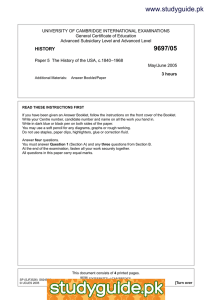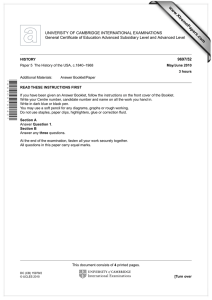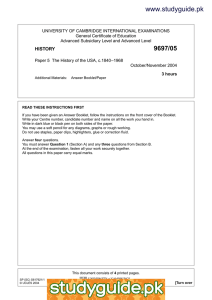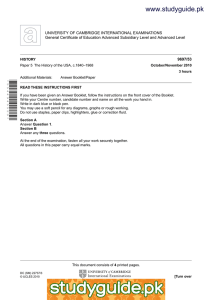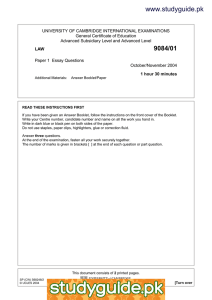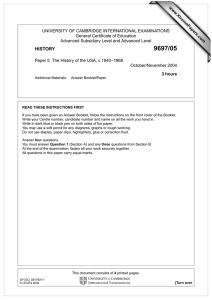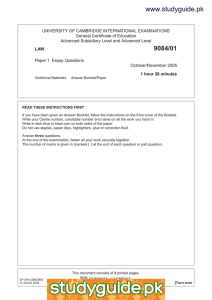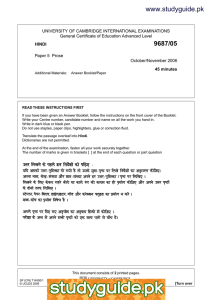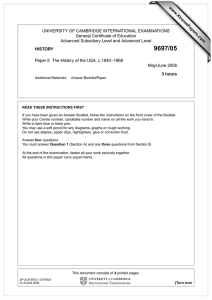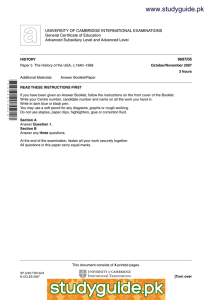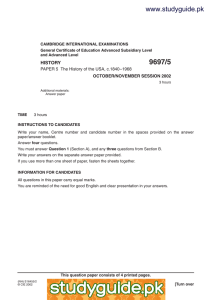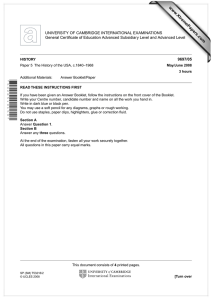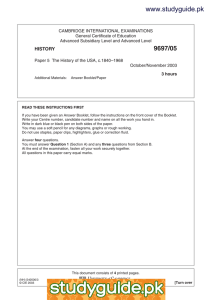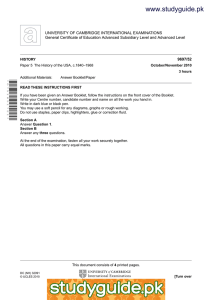www.studyguide.pk
advertisement
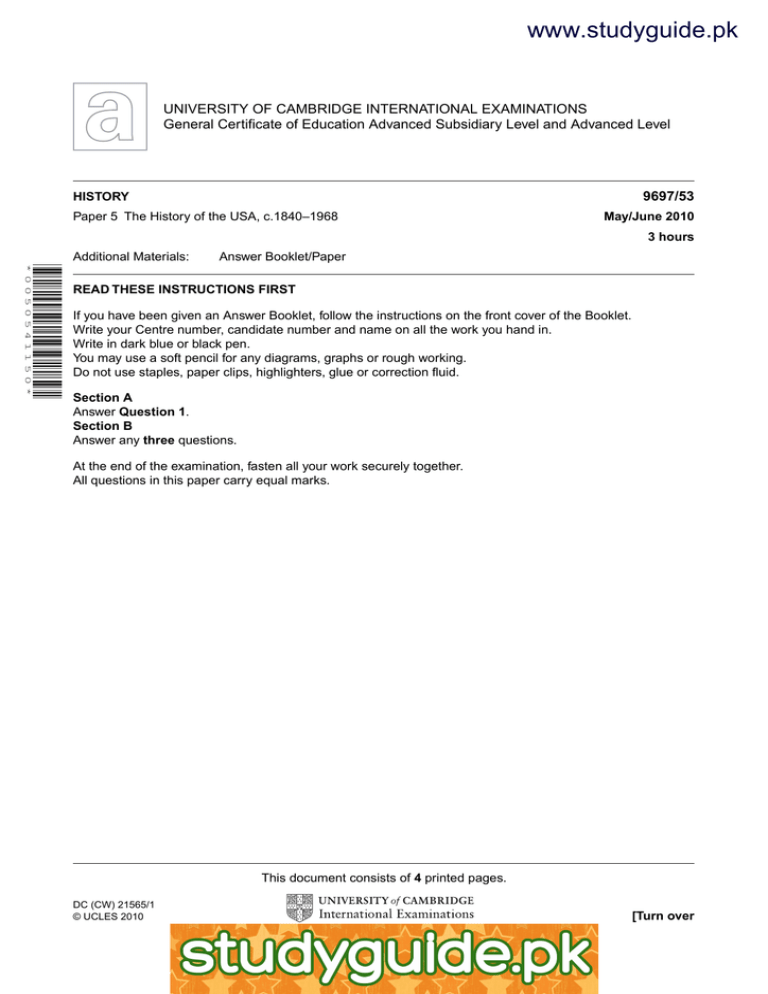
www.studyguide.pk UNIVERSITY OF CAMBRIDGE INTERNATIONAL EXAMINATIONS General Certificate of Education Advanced Subsidiary Level and Advanced Level 9697/53 HISTORY Paper 5 The History of the USA, c.1840–1968 May/June 2010 3 hours Additional Materials: Answer Booklet/Paper *0050541150* READ THESE INSTRUCTIONS FIRST If you have been given an Answer Booklet, follow the instructions on the front cover of the Booklet. Write your Centre number, candidate number and name on all the work you hand in. Write in dark blue or black pen. You may use a soft pencil for any diagrams, graphs or rough working. Do not use staples, paper clips, highlighters, glue or correction fluid. Section A Answer Question 1. Section B Answer any three questions. At the end of the examination, fasten all your work securely together. All questions in this paper carry equal marks. This document consists of 4 printed pages. DC (CW) 21565/1 © UCLES 2010 [Turn over www.XtremePapers.net www.studyguide.pk 2 Section A: The Road to Secession and Civil War You must answer Question 1. THE CAUSES OF THE CIVIL WAR 1 Read the sources and then answer the question. Source A The Northern States have assumed the right of deciding upon the propriety of our domestic institutions, and have denied the rights of property recognised by the Constitution and lawfully established in fifteen of the States. They have denounced as sinful the institution of Slavery; they have encouraged and assisted thousands of our slaves to leave their homes and have incited those who remain to insurrection. A geographical line has been drawn across the Union, and all the States north of that line have united in the election of a man to the office of President of the United States whose opinions and purposes are hostile to slavery. He is not to be entrusted with the administration of the common Government because he has declared that ‘government cannot endure permanently half slave and half free’ and that the public mind must rest in the belief that slavery is in ‘the course of ultimate extinction’. South Carolina’s Declaration of the Causes of Secession, 24 December 1860. Source B My paramount object in this struggle is to save the Union, and is not either to save or destroy slavery. If I could save the Union without freeing any slave, I would do it; and if I could save it by freeing all the slaves, I would do it and if I could do it by freeing some and leaving others alone I would also do that. What I do about slavery I do because I believe it helps to save this Union. What I have here stated is my purpose according to my view of my official duty, and I intend no modification of my often expressed personal wish that all men everywhere could be free. Abraham Lincoln, letter to Horace Greeley, 22 August 1862. Source C One-eighth of the whole population of the nation were coloured slaves, located in the Southern States. These slaves constituted a peculiar and powerful institution. All knew that this institution was somehow the cause of the war. To strengthen, perpetuate and extend this institution was the object for which the insurgents would tear apart the Union even to war, while the government claimed no right to do more than to restrict its territorial enlargement. Abraham Lincoln, Second Inaugural Address, 4 March 1865. Source D The Confederate States fought for the defence of an inherent, unalienable right to withdraw from a Union which they had as sovereign communities voluntarily entered. The existence of African slavery was in no way the cause of the conflict but only incidental to it. Memoirs of Jefferson Davis, former President of the Confederate States of America, 1873. © UCLES 2010 9697/53/M/J/10 www.XtremePapers.net www.studyguide.pk 3 Source E How does one account for the North’s vehement refusal to acquiesce in secession, its passionate attachment to the Union, its willingness to make war to preserve the country’s territorial integrity? Economic motives did undoubtedly play a part. But infinitely more important was the fact that secession challenged the whole ideological basis of American nationalism as understood by Northerners. They had learnt to identify the Union with liberty and democracy and to feel that the maintenance of its territorial integrity was vital. On both sides nationalism was the central issue of the struggle now beginning. While the South contended for separate nationhood to maintain its distinctive way of life based on slavery, the North fought to preserve the ideals the Union had come to symbolise. A modern historian’s analysis of the causes of the Civil War. Now answer the following question. ‘Slavery was somehow the cause of the war.’ Using Sources A-E discuss how far the evidence supports Lincoln’s assertion. © UCLES 2010 9697/53/M/J/10 www.XtremePapers.net [Turn over www.studyguide.pk 4 Section B You must answer three questions from this section. 2 Analyse the causes and consequences of the annexation of Texas by the United States. 3 ‘From the outset it was quite clear that the Union would ultimately be victorious in the Civil War.’ To what extent do you agree with this assessment? 4 Is it correct to say that there was an ‘agrarian revolt’ in the 1870s and 1880s? 5 ‘The role of Malcolm X in securing African-American civil rights has been consistently underestimated.’ How far do you agree with this judgement? 6 Why was Roosevelt’s victory in the 1940 Presidential election much more narrow than in 1932 and 1936? 7 Assess the United States’ contribution to Allied victory in World War II. 8 How important was the role of religion in post-war American society during the period 1945–68? Copyright Acknowledgements: Question 1 Source E © M A Jones; The Limits of Liberty: American History 1607–1980 ; Oxford University Press; 1983. Permission to reproduce items where third-party owned material protected by copyright is included has been sought and cleared where possible. Every reasonable effort has been made by the publisher (UCLES) to trace copyright holders, but if any items requiring clearance have unwittingly been included, the publisher will be pleased to make amends at the earliest possible opportunity. University of Cambridge International Examinations is part of the Cambridge Assessment Group. Cambridge Assessment is the brand name of University of Cambridge Local Examinations Syndicate (UCLES), which is itself a department of the University of Cambridge. © UCLES 2010 9697/53/M/J/10 www.XtremePapers.net
